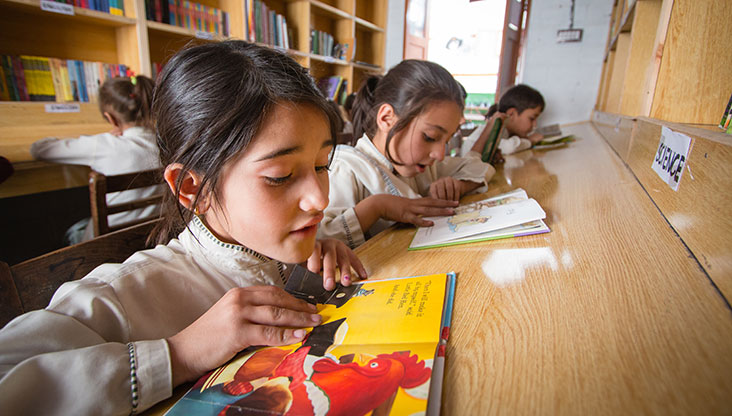The joy of sharing stories
“Storytelling is what connects us to our humanity,” says director, actor and educator Jon Ferreira.
Almost immediately after a child is born, they are shaped by stories shared through songs, rhymes, bedtime tales, and just by listening to conversations. Even in the age of smartphones, research confirms that in many places more parents are reading aloud to their children than ever before.
But as we grow older, our experience of stories becomes more isolated and we read, or use electronic media, by ourselves. Pam Allyn, founder of LitWorld, began her ‘world with literacy’ after visiting communities deprived of education and literacy. World Read Aloud Day (WRAD) was started on February 5, 2010 as a way for teenagers and adults to continue to enjoy and celebrate the joy of sharing stories through reading aloud.
The event has since spread to 170 countries and, this year, Aga Khan school students in a range of geographies have been rediscovering the power of storytelling through the event.
“For the first time it felt like I was not the only one lost in the world of words,” said Shifa Imran, a grade 8 student from Aga Khan School, Garden in Karachi, Pakistan. “My friends were lost with me.”
WRAD challenges participants to find a book and read aloud to any audience they can find. In Pakistan alone, hundreds of students and teachers across the Aga Khan Education Service participated by reading to their peers or to their juniors. They took it further by writing letters inviting prominent Pakistani writers to visit their schools.
The Aga Khan School (AKS), Kharadar, invited parents to bring their favourite book to class, and read it aloud. The AKS in Mirpur Sakro, gave awards to students with the most engaging delivery. In Hafizabad, students read aloud to people in a hospital waiting room, and undertook a book drive, taking what they collected to neighbouring schools and reading to their peers.
“The response was very encouraging,” said head teacher of AKS Hafizabad, Rubina Pervaiz. “People appreciated the efforts of the students and regretted that social media and smartphones were hijacking the reading habit in young people”.
In India, more than 10,000 students, teachers, staff and parents participated in WRAD. In some classrooms, students performed their favourite stories. In others, students took turns with support staff and teachers to read in different local languages and, in others, teachers provoked students to think deeply about the content of the stories by asking questions in between passages. Often a reading would be followed by debate on ethics, values and other issues.
The Aga Khan Education Service operates over 200 educational institutions and programs in 10 different countries. Many of these marked WRAD including in countries where education levels are extremely low, such as Afghanistan.
The sharing of stories is a tradition as old as humanity itself. On WRAD, our students were able to share the stories they read even with their grandparents. “I enjoyed the activities that were conducted at the school today, I am happy that the school has involved us in this reading activity which helped us understand the importance of reading,” gushed a happy grandparent.
Author: Naushad Ali Husein

